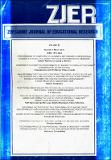| dc.contributor.author | Gatsi, Roswitta | |
| dc.contributor.author | Dyanda, Chipo | |
| dc.coverage.spatial | Zimbabwe. | en |
| dc.date.accessioned | 2016-01-19T12:37:53Z | |
| dc.date.available | 2016-01-19T12:37:53Z | |
| dc.date.issued | 2010-03 | |
| dc.identifier.citation | Gatsi, R. and Dyanda, C. (2010) Vygotsky's co-construction principles: bright children as teachers in Zimbabwean infant schools, Zimbabwe Journal of Education Research, pp. 16-33. Harare: HRRC. | en |
| dc.identifier.issn | 1013-3445 | |
| dc.identifier.uri | https://opendocs.ids.ac.uk/opendocs/handle/20.500.12413/7989 | |
| dc.description | A ZJER study on bright children as teachers in Zimbabwe's infant schools. | en |
| dc.description.abstract | This study investigated the nature of knowledge co-construction between more and less competent children who are often paired as learning partners in Zimbabwean infant classes. A sample of thirty-six (36) pairs of children in the six to eight year age range from infant classes participated in the study. The data were collected using the Flanders Interaction Analysis Categories coding system and were analysed and interpreted through simple descriptive statistics. Overall, the study established that more able partners tended to monopolise the performance of tasks while the less competent partners passively followed what they were instructed to do. The interactive patterns between sets of children showed that bright children tended to tell answers to and work out problems for their less able partners instead of mediating for their partners’difficulties. In turn, the strategies for less able partners included following instructions without question and sometimes giving no responses due to lack of clarity of concepts or demands from their more able partners. The conclusion of the study was that although the young partners may be competent, they may not have efficient co-construction skills which are a core demand in Vygotsky's co-construction paradigm. The idea of using bright children as teachers for the less competent ones in the infant class, under the assumption that they would co-construct knowledge may be questionable.. | en |
| dc.language.iso | en | en |
| dc.publisher | Human Resource Research Centre (HRRC), University of Zimbabwe (UZ) | en |
| dc.rights.uri | http://creativecommons.org/licenses/by-nc-nd/3.0/ | en |
| dc.subject | Children and Youth | en |
| dc.subject | Education | en |
| dc.title | Vygotsky's co-construction principles: bright children as teachers in Zimbabwean infant schools | en |
| dc.type | Article | en |
| dc.rights.holder | University of Zimbabwe (UZ) | en |


